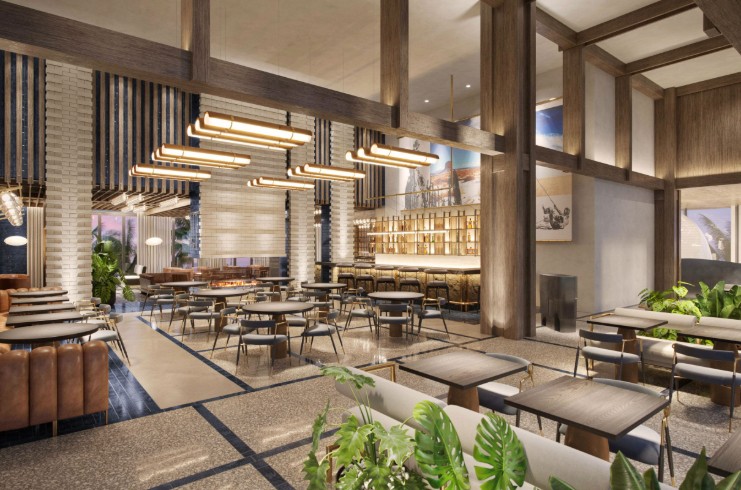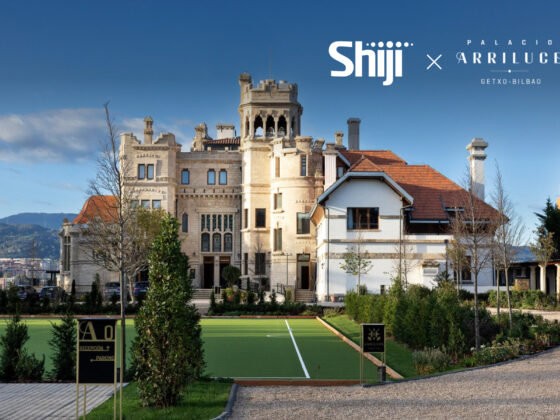The new AI search for travel by Google turns the industry upside down? More on Marriott/Sonder breakup. Clouds go down. Lobbies as pop-up retail.
Hello,
The travel search industry is going to get a real upgrade with AI, but will it change everything? Not totally sure, there’s a lot of business tied into the current paradigm. Sonder news continues. And with that, let’s get into the newsletter.
Note: Have you submitted your ideas to improve the hotel brands chart yet?
Best, Martin
Klairhaus, the perfect employee and customer gifts. Quality, crafted, every day items for the office. Find out more ➛
Google Agentic Bookings
Google’s new Agentic AI booking feature looks amazing. It looks like we finally have a much more intuitive way to search for and book travel, something that we have been sorely missing for some time. Filtering through 2000+ hotels on Booking was never a great experience. Will booking try to manage the full reservation again? They did it with Book on Google some time ago. Will AI agents replace OTAs? Probably not. Look at how Amazon is shutting out all AI agents and don’t forget that most of the internet is funded by ads (and travel pays for a lot of ads). Also see my columns below.
BOOK NOW WITH AI
Your Lobby is the new Flagship Store
Bashar Wali’s article explains how fashion brands are quietly turning hotel lobbies into micro-flagships, with tightly curated assortments that match the property’s vibe. The revenue per square meter on the ground floor of most hotels is lost (when compared to the rooms). Partnering with the right brands or creators could bring a whole new vibe. Many have tried, none became rich – but it could be a brilliant brand collab.
LOBBY RETAIL STRATEGY + REIMAGINED HOTEL SPACES
AI Overviews vs Google Clicks
Seer Interactive’s September 2025 update quantifies what we suspected: when Google’s AI Overviews show up, organic and paid CTRs can drop by over 60%. Being cited inside the AI box, however, boosts clicks dramatically, which turns AI Overviews from a threat into a gatekeeper. Even non-AI results are slipping as users shift research to ChatGPT and social platforms. It’s time to reinvest in SEO, untill we know how to appear in AI overviews.
AI OVERVIEWS CTR
About me: I'm a fractional CMO for large travel technology companies helping turn them into industry leaders. I'm also the co-founder of 10minutes.news a hotel news media that is unsensational, factual and keeps hoteliers updated on the industry. Clouds still go down
Gregory Mermoud’s post uses a major Cloudflare outage to highlight how centralized the modern internet has become. When one provider sneezes, everything from X to Spotify to AI agents catches a cold—and the very tools that could help diagnose and fix the issue are often offline too. Things tend to centralize. So maybe some local storage is still a good thing?
INFRASTRUCTURE FRAGILITY
Mandarin Oriental: Luxury Is Still Human Work
Laurent Kleitman’s essay is a timely counterweight to AI euphoria: at the top end of hospitality, guests are paying for empathy, intuition, and care. Not slick apps and facial recognition. In fact if you go to speak to the real innovators in the luxury space, like Peninsula and others, there is a pretty precise vision for technology. And the guests will see it.
LUXURY HUMAN CONNECTION
B2B Marketers at Advertising Week 2025
An interesting summary from Advertising Week New York: AI is now unavoidable, but trust still wins deals. Use AI to speed up research, content, and targeting, while relying on creators and communities to inject credibility and humanity. It’s less “replace your marketers with tools” and more “give them superpowers and new collaborators.” I think AI will not replace most people but will make them output more.
B2B AI & TRUST
Media doesn’t need more Ads, It needs better ones
GenAI should be used to make retail media better, not just pushing more ads on top (I’m looking at Amazon and Google here). Instead of flooding every pixel with more ads, there’s a chance to generate more emotionally resonant campaigns at scale. In the 60s when ads were expensive creativity was critical. But what if we brought it back now?
SMARTER RETAIL MEDIA
Seven Seconds to Brand
I don’t know if the seven seconds theory is true, but the rest of the concept does. Whether one is a designer or not, the coherence of the brand is the first point that shines through. Yet for a startup a messy brand and “we just get stuff done” might even be the brand. It’s just perspectives.
FIRST IMPRESSION BRANDING
The Upside of Bubbles?
Bezos and this piece argue that bubbles, for all the destruction they cause, are often how we pre-pay for the infrastructure of the future. The dot-com boom funded the pipes and data centers we still rely on. It’s not a great theory, I think some people are scrambling to find a reason for a softer landing. Financing chips isn’t quite the same. Nothing has a shorter lifespan in tech than chips.
AI INVESTMENT CYCLE
Behind the Marriott/Sonder scene
Some data on how the Marriott/Sonder story unravelled. Maybe this proves that in the end a business needs to make more money than it spends. The hope that “we’ll figure this out when we’re too big to fail”, rarely works out.
SONDER’S ATTEMPTED LEVERAGE + SONDER NEWS TIMELINE
Opinion
Google AI in Travel: This Changes Everything?
Every few years, a new tech wave arrives and we hear the same headline: “This changes everything.” And perhaps, eventually, it does (but almost never in the way that is forecasted).
This week, Google announced major updates to its travel planning experience using AI agents that can plan trips across flights, hotels, restaurants, and things to do. You can ask it to “plan a 5-day trip to Tokyo” and get a full itinerary with suggested booking links, prices, and availability, plus the ability to customize and save the plan. It’s impressive. It’s helpful. But it also triggered the usual round of doomsday marketing predictions: “OTAs are done.” “Brand is dead.” “Everything is just commoditized inventory now.”
Let’s take a breath.
We’ve heard this before. When search took over directories, when metasearch overtook direct search, when voice was going to dominate travel planning, and when chatbots were going to replace customer service. Each time, the underlying dynamics shifted, yes, but the core principles remained.
And here’s one of those core first principles of marketing: as long as there is choice, there will be marketing.
No matter how sophisticated the AI, suppliers still need a way to present options to the possible buyers. And guess what? That means they will still need a way to influence visibility. The current AI interface may not show 10 blue links, but make no mistake, some form of prioritization will need to exist. And if prioritization exists, someone will pay to improve their position. And that is too much money for the AI companies to ignore. Note that despite subscriptions, most of the internet is powered by ads.
This is the same trajectory we saw with Google Search and Amazon. First it was all about organic results. Then came paid search. Then shopping ads, travel ads, and now AI summaries. AI search might change the packaging, but it doesn’t eliminate the first principle: as long as there is choice, someone will go invest effort to present their option.
So no, brand isn’t dead. Marketing isn’t dead. But lazy marketing is. AI will force us to build better brands, tell better stories, and create more compelling propositions, because you won’t have as many chances to “explain later.” You’ll need to show up strong, early, and be hyper relevant.
Unless we reach a future where there’s only one hotel option, one airline, and one restaurant per destination, marketing will live on.
And so will good marketers.
PS: I believe the last time in history when there was no need for marketing was in those coutnries where every product on the shelf was state-controlled and only a single version of that product existed. In the end people wanted choice.
• McKinsey’s Business Model Is Quietly Changing – Link
• Agentic AI Is Quietly Redesigning Retail – Link
• AI as a Multiplier, Not Just a Cost Cutter – Link
• Jaws, Broken Robots, and the Value of Constraints – Link
• Brand ads for the Holidays, inspiration – Link
• NEW: Hotel Design & Tech Benchmark Q4 2025 – Link⁺
Lobby: The word “lobby” comes from Medieval Latin “lobia,” meaning a covered walk or gallery. It entered English in the 16th century, first describing a corridor or waiting area. Defined using Lomar Dictionary⁺⁺ Note, articles that are published by companies or people I work with are tagged with the ⁺ symbol or Partner word. I’m adding this as a transparency. Previously I avoiding sharing content from partners to remain objective, but sometimes they have excellent articles that deserves being shared so to remain transparent, I’ll tag them.
Start writing today. Use the button below to create your Substack and connect your publication with Tell • Martin Soler’s Newsletter








